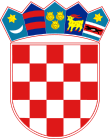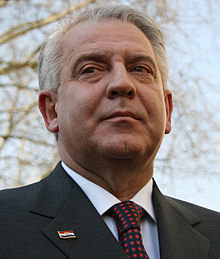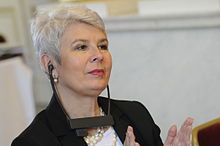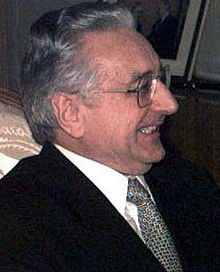- Croatian Democratic Union
-
Croatian Democratic Union
Hrvatska demokratska zajednica
Leader Jadranka Kosor Founder Franjo Tuđman Founded 17 June 1989 Headquarters Zagreb Youth wing Youth of the Croatian Democratic Union Ideology Christian democracy,
Conservatism,
Pro-Europeanism
(Formerly
Right-wing Nationalism)[1]Political position Centre-right International affiliation Centrist Democrat International (CDI)
International Democratic Union (IDU)European affiliation European People's Party Official colours Blue Seats in Sabor 65 / 153Website hdz.hr Politics of Croatia
Political parties
ElectionsThe Croatian Democratic Union (Croatian: Hrvatska demokratska zajednica, HDZ) is the main center-right political party in Croatia. The Christian democratic HDZ governed Croatia from 1990 to 2000 and, in partial coalition, from 2003. The party is an associate member of the European People's Party (EPP).
Contents
History
Origins
The HDZ was founded in 17 June 1989 by Croatian nationalist dissidents led by Franjo Tuđman. When the party was founded, the multi-party system in Croatia was at an embryonic stage and open manifestations of Croatian nationalism were frowned upon. The HDZ was founded in an almost conspiratorial manner, and its first offices were in a Zagreb shack. Because of that the party founders proudly call themselves barakaši - from "baraka", which is the Croatian word for "shack".
Despite such humble beginnings, the party quickly benefited from the loosening of Communist control. Tuđman and other HDZ officials traveled abroad and gathered large financial contributions from Croatian expatriates, with this reflected in a more nationalist HDZ platform.
On the eve of the 1990 elections, the ruling Croatian Communist Party saw such tendencies within the HDZ as an opportunity to remain in power. The voting system was tailored to favour the two strongest parties and it was assumed that Croatian voters would opt for the ruling Communists, re-branded in as the Social Democratic Party of Croatia, as a lesser evil than the HDZ, which they described as "the party of dangerous intentions". At the elections this proved to be miscalculation, because the overwhelming majority of Croatian people that voted in the election saw the patriotism of the HDZ not only as the best way to get rid of Communism and Yugoslavia, but also as the proper answer to what they saw as "Serb nationalism", embodied in part by Slobodan Milošević.[citation needed] The HDZ won a majority in the Croatian Parliament, and Croatia became one of the few countries of Eastern Europe where Communist single party rule was replaced by anti-Communist single party rule. May 30, 1990 - the day the HDZ formally took power - was later celebrated as Statehood Day, a public holiday in Croatia.
Tuđman presidency
The presidential elections followed in 1992 and Tuđman, who would remain as undisputed party leader until his death in 1999, was elected president.
The party ruled Croatia throughout the 1990s and under its leadership, Croatia became independent (1991), was internationally recognised (1992), and consolidated all of its pre-war territory (by 1998). During that period, the HDZ won both the 1992 and 1995 parliamentary elections.
As it strongly advocated Croatian independence, the HDZ was quite unpopular with the Serb minority, and others who preferred to see Croatia remain inside the Socialist Federal Republic of Yugoslavia. This was one of the factors contributing to the creation of the Republic of Serbian Krajina and the subsequent armed conflict in neighbouring Bosnia-Herzegovina. The role of the HDZ in those events is matter of controversy, even in Croatia, where some tend to view HDZ policy in the early stages of the conflict as extremist and a contributing factor in the escalation of violence, while others see the HDZ as having appeased Serbia and the Yugoslav People's Army, and therefore, being responsible for Croatia being unprepared for defence.[citation needed] However, the policies of Tuđman and the HDZ shifted according to the circumstances.[citation needed]
Transition to capitalism
The HDZ also began to lead Croatia toward political and economic transition from communism to capitalism. Notably, HDZ governments implemented privatization in the country, in a manner that critics consider sub-optimal, and at times possibly illegal, due to the selective nature of the nationalizations. According to the HDZ, this process proved a useful distraction from dealing with the baggage of post World War II communist nationalizations. In fact it was the HDZ in 1992 which enacted into law the right of corporations (the vast majority of which were under state ownership) the right to finally formally register themselves as the owners of nationalized property, thus completing their own version of a process of quasi-nationalization started by the communist regime after WWII, in different targeted areas for their own gain.
As a result of these, and other, schemes, that had been planned before the break-up of Yugoslavia, many "tycoons" emerged in a pattern of state-sponsored loans brokered with HDZ influence, with the purpose of dissolving state ownership. This model was widely abused, not only by the HDZ, but also by other political parties.
Not all of the nationalized property was dealt with in this way. The property of those who could lobby the HDZ, or who had substantial influence in Croatian politics, was returned without much delay, while others had to wait for justice. Property returned included possessions nationalized from the Catholic Church or from widely known individuals such as Gavrilović, the owner of a major meat-producing factory in Petrinja, south of Zagreb. Restitution for land seized during the break-up of Yugoslavia is still of great public concern.[citation needed]
Ideology
In terms of ideology, HDZ leaders at first described their party as right-wing, and Tuđman himself stated that he was inspired by Thatcherism. Later, the party described itself as centre-right and Christian Democrat. However, the only official ideology was nationalism. In practice, this policy saw the powerful defence minister Gojko Šušak, head of the HDZ hardline faction, win Tuđman's favour. Stjepan Mesić and Josip Manolić, Tuđman's associates opposed to such tendencies, left the party in 1994 and formed the Croatian Independent Democrats. These tendencies were toned down after the end of the war and the HDZ, concerned with more mundane aspects of politics, became a mainly social conservative party.
The end of war and reintegration of Croatian territory also switched Croatian people's attention from independence and foreign relations to the more mundane issues of the economy and living standards. In the late 1990s this coincided with Tuđman's illness, which sparked bitter succession struggles between various factions within the HDZ. These factions fought using friendly media and by leaking compromising information about their opponents' roles in the shadier aspects of privatisation. This, as well as Tuđman's mishandling of the Zagreb Crisis, did much to undermine HDZ credibility.
HDZ after Tuđman's death
Croatia 
This article is part of the series:
Politics and government of
CroatiaConstitutionJudiciaryExecutive- President (List)
- Ivo Josipović
- Government (List)
- Prime Minister
- Jadranka Kosor
- Cabinet
- Prime Minister
- Croatian Democratic Union (HDZ)
- Social Democratic Party (SDP)
- Croatian People's Party -
Liberal Democrats (HNS-LD) - Croatian Peasant Party (HSS)
- Istrian Democratic Assembly (IDS)
- Croatian Democratic Alliance
of Slavonia and Baranja (HDSSB) - Croatian Social Liberal Party (HSLS)
- Croatian Party of Pensioners (HSU)
- Croatian Party of Rights (HSP)
Divisions
All this, together with Tuđman's death in December 1999, had an impact on the 2000 parliamentary elections. Although the HDZ remained the largest single party, it was defeated by a left-centre coalition of six opposition parties and many saw the large turnout as a referendum against the HDZ, just as the 1990 elections had been seen as a referendum on Communism and Yugoslavia. This impression was underlined at the subsequent presidential election, when the HDZ candidate Mate Granić, heavily favoured to win, finished third and therefore failed to enter the second round of voting, won by Stipe Mesić.
In the period from 2000 and 2003, several businessmen who became tycoons under the initial HDZ rule were tried and convicted for alleged abuses, though in general the privatization process implemented by the HDZ remained unaltered.
This period proved to be a low point for the HDZ and many thought that party could not recover. Those included Mate Granić, who, together with Vesna Škare-Ožbolt, left to form the centre-right Democratic Centre (DC).
The HDZ began to recover when the International Criminal Tribunal began to prosecute Croatian Army commanders, thus provoking a major backlash among the Croatian public. Popular discontent manifested itself in mass rallies as the public came to terms with the changes in the party and its policies. Although the HDZ, and its new leader Ivo Sanader, took part in those events and supported the protests, they gradually began to distance themselves from the more extreme rhetoric, becoming perceived as moderates. This tendency continued when the Croatian Social Liberal Party shifted rightwards, making Sanader's HDZ appear centrist in comparison. This process was completed in 2002 when Ivić Pašalić, leader of the HDZ hardliners and perceived to be associated with the worst excesses of Tuđman's era, challenged Sanader for the party leadership, accusing him of betraying Tuđman's nationalist legacy. At first it looked that Sanader would lose, but with the help of Branimir Glavaš and the tacit support of liberal sections of Croatian public opinion, he won at the party convention. Pašalić then left the HDZ to form the Croatian Bloc party.
This allowed Sanader to present the HDZ as a "reforming" party, one that would completely face what they had created, purged of some of the more controversial aspects of the Tuđman legacy, and to convince the public that returning the HDZ to power would not jeopardise democratic standards in Croatia. As such, the HDZ started to be perceived as a credible democratic alternative to the government of Ivica Račan, then plagued by the same indecision, inefficiency, corruption and factional struggles, though it was the tip of the iceberg with much more to come.[citation needed]
First Sanader government 2003–2008
 Ivo Sanader, president of the Croatian Democratic Union from 2000 - 2009
Ivo Sanader, president of the Croatian Democratic Union from 2000 - 2009
At the legislative elections of November 2003, the party won 33.9% of the popular vote and 66 out of 151 seats. Although it failed to win a clear majority in the Croatian Parliament, even with the help of the allied DC and HSLS, it formed a government with the nominally left-wing Independent Democratic Serb Party and the Croatian Party of Pensioners.
With such a broad and diverse mandate, the Sanader-led government vigorously pursued policies that amounted to the implementation of the basic criteria for joining the European Union, such as the return of refugees to their homes, rebuilding houses damaged in the war, improving minority rights by including minority representatives in the government, cooperating with the ICTY, and continuing to consolidate the Croatian economy. Despite this, the EU's Council of Ministers postponed Croatia's membership negotiations with the union on the grounds of its non-cooperation with the Hague Tribunal over the case of indicted general Ante Gotovina.
This setback brought an increase in Eurosceptic views among the Croatian public, which also affected support for the HDZ. Since accession to the EU was a key part of Sanader's reformist course, opposition to his leadership within and outside HDZ was on the rise. This opposition manifested itself at the 2005 local elections and the defection of Glavaš, who not only successfully challenged Sanader's authority but also managed to nominally deprive Sanader of his parliamentary majority.
Second Sanader government 2008-2009
Despite this defeat, the first Sanader led government was able to survive until the end of the legislature. The subsequent parliamentary election in late November 2007 saw the HDZ hard-pressed both by the SDP-led leftist coalition and by the extreme right wing Croatian Party of Rights and Croatian Democratic Assembly of Slavonia and Baranja.
During the electoral campaign a vigorous and sometimes ruthless reaction from the party and Sanader himself, together with some capital errors from SDP, convinced part of the far right electorate to support the HDZ in order to prevent what they perceived as the heirs of the former communist party to return to power.[2][3] The party won a majority of both seats and votes in the election, and the first session of the newly elected parliament was called for 11 January 2008. However, the SDP repeatedly refused to acknowledge defeat, claiming that they had the most votes if the Diaspora ballot was not taken into account. The HDZ gained the support of the "yellow green coalition" (HSS-HSLS) and of the HSU and national minorities representatives, and so a second government, still led by Ivo Sanader, was formed.
Although that government had a larger majority than the former one, its existence remained troubled, because of the worsening of the previously good economic situation and a weariness of Croatian public opinion about what was felt to be an overly long HDZ rule.[citation needed] Another major drawback was the Slovenian blocking of several chapters of Croatia's EU accession terms, until border disputes between the two countries had been settled.[citation needed] Although this ultimately lead to an indefinite suspension of the Croatian EU accession negotiations, it had no impact on the government's popularity. In this case, as would be expected, considering Croatian staunch patriotism and national self-consciousness, all parties and nearly every Croatian citizen were absolutely adamant in refusing at any cost any concessions over matters of national interest.[citation needed]
In the general local elections held in May 2009, the HDZ, against all expectations, managed to grow again, coming ahead of the SDP.[4] However, HDZ support did weaken in the larger cities.
On 1st July 2009, Ivo Sanader abruptly announced his resignation from politics and appointed Jadranka Kosor as his successor. She was confirmed as the new leader of the party on 4th July, and was appointed by president Stipe Mesic as the prime minister-designate. Two days later the Sabor confirmed Kosor as the new prime minister, the first woman to hold the position.
In the same resignation speech, Sanader also appointed Andrija Hebrang, who had formerly held the posts of defence minister and health minister, as HDZ candidate for the incoming presidential election, so decreasing any speculation about his own ambitions for that position.
Government of Jadranka Kosor
 Jadranka Kosor, president of the Croatian Democratic Union from 2009
Jadranka Kosor, president of the Croatian Democratic Union from 2009
The HDZ was faced with bad poll ratings and a large clean-up task that was still underway when Sanader left. The officials used the 2009 convention to elect Jadranka Kosor the party president by acclamation, and proceeded to make various unpopular measures to tackle the economic crisis. Andrija Hebrang accepted his designation as the presidential candidate only at the end of July, after he underwent a thorough medical examination, to exclude any remaining trace of a previous carcinoma.
The Kosor government remained mostly unchanged from the previous Sanader government, but the HDZ suffered some internal turmoil as ministers Berislav Rončević and Damir Polančec left their posts after allegations of corruption.
In the next presidential elections, Croatia was looking for a replacement for Stipe Mesić who had held the position for ten years. But Hebrang finished third, failing to reach the second stage in which SDP candidate Ivo Josipović overwhelmingly defeated former SDP member Milan Bandić.
However, many Croatian people were dissatisfied with the government, and protested on the streets against the HDZ government, demanding that new elections be held as soon as possible. The police placed a guard on St. Mark's Square, to prevent civilians from entering.[5]
From 26 October 2011 USKOK expanded it's investigation about "Slush Funds" on Croatian Democratic Union as legal entity.[6] Previously, investigation included only Ivo Sanader, treasurers Milan Barišić and Branka Pavošević, general secretaries Branko Vukelić and Ivan Jarnjak and spokesman Ratko Maček.[6] Jadranka Kosor, president of the party, stated that this is one of the most critical moments of Croatian Democratic Union.[6]
List of presidential candidates
- 1992 - Franjo Tuđman (Won, with 56.73% of votes in first round)
- 1997 - Franjo Tuđman (Won, with 61.41% of votes in first round)
- 2000 - Mate Granić (Finished third with 22.47% of votes in first round)
- 2005 - Jadranka Kosor (Finished second with 20.31% of votes in first round and was runner-up in second round with 34.07% of votes)
- 2010 - Andrija Hebrang (Finished third with 12.04% of votes in first round)
See also
References
- ^ http://www.wilsoncenter.org/sites/default/files/MR296Boduszynski.doc
- ^ http://www.javno.com/en-croatia/vote-for-hsp-is-vote-for-sdp---sanader_82105
- ^ http://www.studiacroatica.org/bol2007/20070912_diaspora.htm
- ^ http://www.setimes.com/cocoon/setimes/xhtml/en_GB/features/setimes/features/2009/05/21/feature-03
- ^ http://danas.net.hr/hrvatska/page/2011/02/27/0033006.html
- ^ a b c Capar, Luka; Toma, Ivanka. J. Kosor: Neću dati ostavku i nećemo dopustiti da se HDZ uruši. Večernji list. 2011-10-27. Retrieved 2011-10-27 (Croatian)
 Political parties in Croatia
Political parties in CroatiaParliamentary
parties in the
6th SaborMajorCroatian Democratic Union (HDZ) (65) · Social Democratic Party (SDP) (53)MediumMinorIndependent Democratic Serbian Party (SDSS) (3) · Istrian Democratic Assembly (IDS) (3) · Croatian Democratic Alliance of Slavonia and Baranja (HDSSB) (4) · Croatian Social Liberal Party (HSLS) (0) · Party of Democratic Action (SDA) (1) · Croatian Party of Pensioners (HSU) (1) · Croatian Party of Rights (HSP) (1) · Croatian Labourists – Labour Party (1) · Croatian Social Democrats (1)Categories:- Catholic political parties
- Political parties in Croatia
- International Democrat Union member parties
- Political parties established in 1989
- Right-wing populism
- President (List)
Wikimedia Foundation. 2010.

